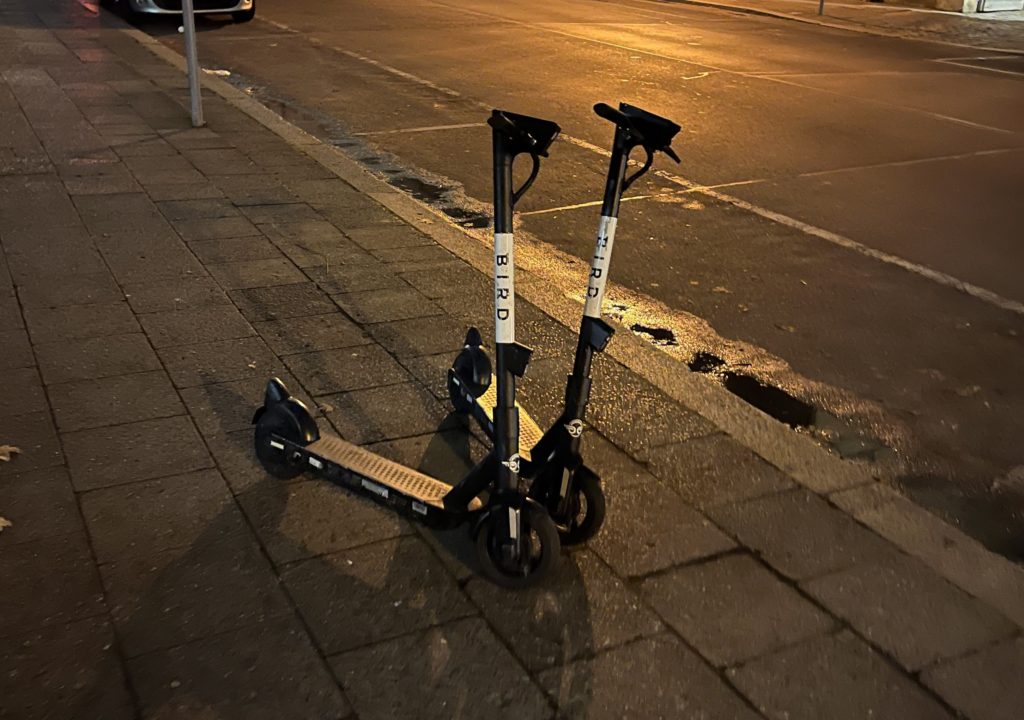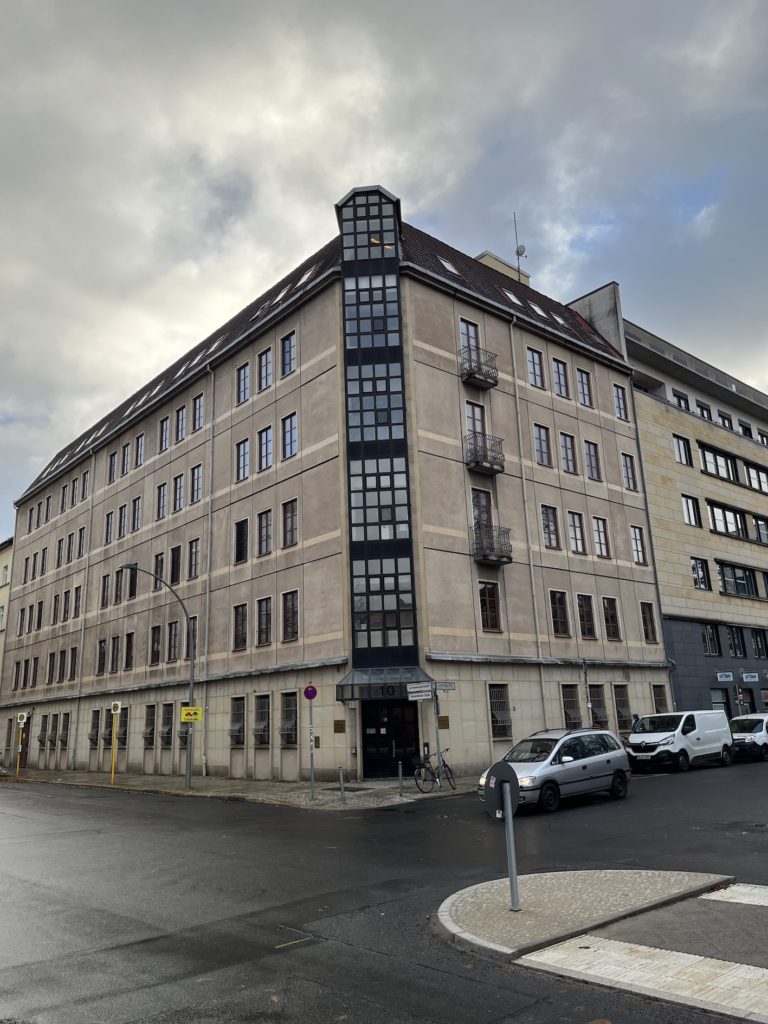Berlin Diary I: eScooters, Bake Off, Theatre History Heaven
Two and a half years. It’s been almost a thousand days since I’ve last set foot on European soil, the longest I’ve been away from here in my entire life, and boy is it nice to be back, even though the Covid numbers in Germany are exploding and, thanks to flight delays and rebookings, I ended up wearing an N95 mask more or less non-stop for 18 hours on the way here, which gave me a pretty good sense of why they don’t recommend doing that sort of thing.
Has Berlin changed? Not noticeably. One of my favourite grab-a-very-quick-bite-before-rushing-to-the-theatre spots has transformed itself into a fancy wine place, which is a little annoying. On the other hand, one of the very, very few positive side-effect of the pandemic is that everywhere — but EVERYWHERE — now accepts credit card payments. Other than that, the place looks and feels pretty much as it did in 2019. I sat in a completely sold out theatre this evening, with an audience about as middle-aged-trending-towards-retirement as I’m used to seeing in most Berlin theatres, and many of them headed to the theatre cafeteria for a drink afterwards (presumably without the masks we all wore during the show). Me, I wandered along the always fairly deserted residential streets of Mitte, contemplating the weirdness of eScooters.
Those didn’t really exist two years ago; now they’re everywhere, and they’re oddly present, materially insistent. Which is strange. It’s not that they’re especially big — in fact, they take up less room than a bike, though their squatness, the thickness of their frame, seems to make them more noticeable. Visually impolite, in a way. Making undue demands on one’s attention. They’re also morphologically unsettling. It’s something about the way they’re parked: not quite upright, but not leaning far enough to the side either, just slightly angled, as if frozen in time while negotiating a long curve. And because their little stand is almost invisible, their position feels uncanny: nothing should be able to just stand askew like that. Walking along the street, your empathy is triggered over and again by eScooters that fool you into thinking they’re about to fall. Also part of this frozen motion effect is that they all look ready to take off: unlike bikes, which are locked to things, clustered together, clearly rendered immobile and safe from theft, and unlike cars, which are little worlds onto themselves, closed off, ignoring you and allowing you to ignore them (especially if parked and empty), the eScooter somehow always seems to be about to get going, or not quite fully stopped, just leaning in space for a moment. And they’re unsettling morally, too. They just stand there, apparently unowned, apparently unlocked, a seeming invitation to hop on and take off. I assume that wouldn’t actually work, but the temptation is very real. Except I’ve also seen what people look like on those things, and it’s not much of an improvement on a Segway.
Sometimes they stand in pairs, and that makes them a little less unsettling.

*
While trying to stay awake early in the evening yesterday, I discovered that there is now a German version of the Great British Bake Off, scheduled, in evident disregard for the brilliance of the format, in the early evening — the traditional soap opera slot on German TV. It’s deeply uncanny: just close enough to the original to be perfectly recognizable, and yet so disturbingly different (unlike the Canadian version, which is basically identical but very Canadian where GBBO is very UK). For one, it’s spectacularly ugly, with a nearly all-purple set, and even though they’ve kept the tent they’ve covered it in stage lights suspended from dropped ceilings. There’s an almost Brechtian insistence on making the tech visible: all the contestants wear hideous lavalier mics attached to their faces, so they look like they’re selling knives on the Shopping Channel. On the other hand, almost all of the human interaction, especially between the hosts and the contestants, is absent. It’s almost as if the producers think the show is only about baking. There’s only one host, for starters, and she doesn’t seem interested in silly jokes and salacious puns; she also doesn’t talk to the contestants. Instead, there’s a disembodied male voiceover that asks them questions, which they answer to a disembodied camera eye, nervously. The judges hover occasionally, but they don’t do the usual group visits to each station. Oh god, and the music. The title sequence is basically the same visuals, but with a bizarre cover version of “Build me up, Buttercup” (!!!) as the theme tune. And throughout the show, they keep piping in thematically matched music for each contestant and each bake: it’s a profoundly disorienting hodgepodge of stock tunes, assembled by an elevator muzak DJ on speed.
But none of this is as remarkable as the judging. It goes on forever. FOREVER. They comment on absolutely everybody, and in some detail. They have clipboards. They award points for specific things. When they rank people during the technical, everyone gets a score, and everyone’s score is announced, one at a time. And then at the end, they tally up the three scores, and the person with the fewest points goes home. One the one hand, that just seemed profoundly unentertaining: there’s obviously a ton of repetition in the comments, and the judges aren’t exactly prime time TV personalities. On the other hand, I found myself thinking that it was much fairer than the UK/Canadian process: have we not all wondered why people’s catastrophic (or stellar) performances during the signature round never seems to matter in the end, and why and how some showstoppers seem to cancel out total failures in the technical while others don’t? Not on Das Grosse Backen (yeah… “The Great Baking” is what this is called!). A dismal signatures with a crappy score will hang like an anchor around a contestant’s neck to the end, and even a perfect score for a showstopper isn’t going to rescue that lacklustre average.
Technically, all the bakers seemed pretty impressive; aesthetically, um, not so much:
Then again, the trophy is a gigantic golden cupcake (you can see it behind the judges!), so aesthetic abjection is certainly on brand for Das Grosse Backen.
*
I’m not here, strictly speaking, to look at eScooters or watch German Bake Off, though. I’m here to return, finally, after a too-long hiatus, to the research on my endless Shakespeare in Berlin project, and for that, I get to spend all my daylight hours in the archive of the Academy of the Arts — a spectacularly nondescript GDR building that houses a breathtakingly rich treasure of theatre historical material. Just today, I got to work my way through not just a prompt book for Erich Engel’s 1937 production of Coriolanus, but three sets of interleaved copies of the standard Dorothea Tieck translation, covered in layers and layers of rewrites, one set by Engel, the other, initial, set by one of the Deutsche Theater’s dramaturgs; a cue script; a version of the prompt book that Engel had annotated during what must have been a close-to-final run (“this needs more rehearsing!”); a stage-manager’s prompt book so detailed it’s almost a verbal description of the show (meant, I think, for the frequent remounts and brush-up rehearsals common in the German repertory system); dozens of photos; and, of course, dozens of newspaper clippings with reviews (though those, during the Nazi years, aren’t especially helpful, since critics were meant to suspend their critical faculties). Now, this particular production is reasonably well known, partly because Engel had directed an earlier staging of Coriolanus in 1925 which, by some accounts, hugely influenced Brecht, and because Engel went on to work closely with Brecht at the Berliner Ensemble, where their conversations influenced Brecht’s own adaptation of the play. But as far as I can tell, no-one has actually looked at and made use of any of these archival materials — and more staggeringly, similarly rich documentation exists for many, many other productions, going back to the beginning of the century. Things will get properly wild when I get to the GDR years, when most of the East Berlin theatres adopted the Berliner Ensemble’s policies of documenting rehearsals and production processes in absolutely exhaustive details — that’s when I’ll get to go through hundreds and hundred of pages of rehearsal protocols for shows famous and utterly obscure. And all of this, kilometres of files full of this stuff, is just sitting there, in this spectacularly nondescript corner building in central Berlin, mostly untouched. I love this place.

- Click to email a link to a friend (Opens in new window)
- Click to print (Opens in new window)
- Click to share on Facebook (Opens in new window)
- Click to share on Twitter (Opens in new window)
- Click to share on Tumblr (Opens in new window)
- Click to share on LinkedIn (Opens in new window)
- Click to share on Reddit (Opens in new window)
- Click to share on Pinterest (Opens in new window)
Recent Comments
- Die Berliner Volksbühne: Ein Zentrum für politisches und experimentelles Theater - Kunst 101 on What’s so special about German theatre: Part 1
- My Homepage on Shakespearean Mythbusting I: The Fantasy of the Unsurpassed Vocabulary
- Premodern Performance-based Research: A Partial Bibliography – Alabama Shakespeare Project on My Trouble with Practice-as-Research
- Premodern Performance-based Research: A Partial Bibliography – Alabama Shakespeare Project on Where is the Theatre in Original Practice?
- Alex on Steven Moffat, Sherlock, and Neo-Victorian Sexism
Archives
- November 2021
- April 2020
- March 2020
- October 2019
- January 2019
- December 2018
- November 2018
- October 2018
- March 2018
- February 2018
- January 2018
- July 2017
- May 2017
- March 2017
- November 2016
- October 2016
- September 2016
- August 2016
- June 2016
- May 2016
- January 2016
- December 2015
- November 2015
- October 2015
- September 2015
- August 2015
- July 2015
- June 2015
- May 2015
- February 2015
- January 2015
- November 2014
- October 2014
- September 2014
- August 2014
- July 2014
- May 2014
- April 2014
- March 2014
- February 2014
- January 2014
- November 2013
- October 2013
- September 2013
- August 2013
- July 2013
- May 2013
- April 2013
- March 2013
- January 2013
- December 2012
- November 2012
- October 2012
- September 2012
- August 2012
- July 2012
- April 2012
- March 2012
- February 2012
- January 2012
- December 2011
- November 2011
- October 2011
- September 2011
- August 2011
- July 2011
- June 2011
- May 2011
Copyright

Holger Syme's work is licensed under a Creative Commons Attribution-NonCommercial 3.0 Unported License.Images may be reused as long as their source is properly attributed in accordance with the Creative Commons License detailed above. Many of the photos here were taken at the Folger Shakespeare Library; please consult their policy on digital images as well.





